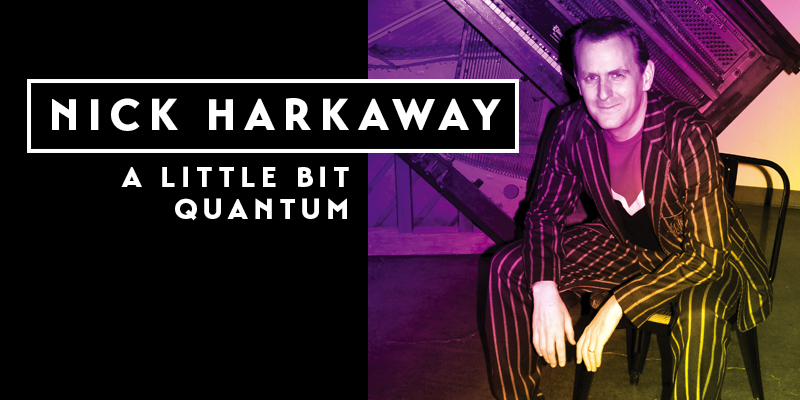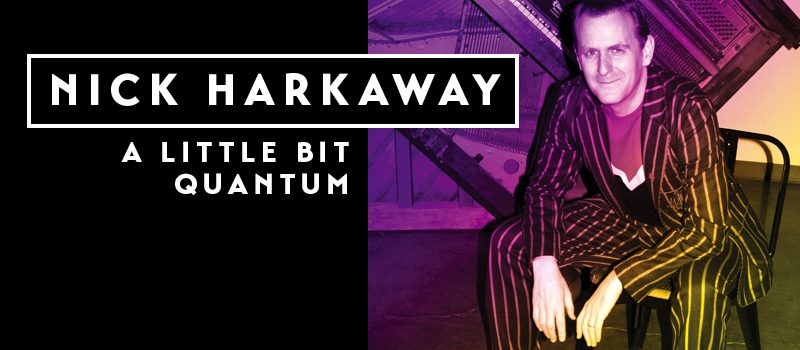Nick Harkaway: A Little Bit Quantum

NICK HARKAWAY is a pseudonym for Nicholas Cornwell, born November 26, 1972 in Cornwall England, son of author David Cornwell (better known by his pen name John le Carré) and editor Valérie Jane Eustace. He attended University College School in North London, and Clare College, Cambridge, where he studied philosophy and earned a degree in social and political science. An avid martial artist, he has studied Shorinji Kan Jiu Jitsu, kung fu, bagua, and tai chi. After graduating, he worked in production on film sets and wrote screenplays before turning to prose.
Post-apocalyptic debut novel The Gone-Away World appeared in 2008, and was a BSFA Award finalist. His follow-up, SF spy thriller Angelmaker (2012), was a Clarke Award finalist, while Tigerman (2014) combines espionage, post-colonial politics, and comic book tropes. His latest novel is near-future SF Gnomon (2017). Harkaway occasionally writes short fiction, and wrote non-fiction book The Blind Giant: Being Human in a Digital World (2012).
Harkaway lives in England with his wife Clare and their two children.
Excerpts from the interview:
“When I finished university, I had a degree in social and political science, and I had a choice, really. I could go off and do a master’s in international law, or I could go in some other direction. A lot of the people in my generation who might have gone into politics went into media instead. In that moment in the UK, there was quite a strong perception that the political apparatus was corrupting and ineffectual, and if you wanted to change the system, you had to go at it from the outside and kick the broken structure until it did the right thing. I got a job as a production runner on a film set and worked on a couple of movies. Film sets are incredible. Sometimes you’ve got 350 people for the period of the production. They slave day and night, sometimes in quite dangerous corners on location. Even in the studio, it’s hard work – you work 18 hours a day, and that happens for ten weeks, 12 weeks, 15 weeks, until the whole thing goes to post-production. Millions and millions of pounds or dollars get spent, and none of it matters if the script is no good. You can screw up a good script, but you cannot fix a bad script on the stage. When you see Robert De Niro in a movie that does not work, that’s when you know the script is the problem. De Niro can make you believe anything with his voice. If he can’t make you believe, it’s not a good story.
“I started wanting to tell stories. I thought, ‘Writing screenplays – I can do this.’ Which was not true. I was not great at it. Or was I just telling the wrong stories to the wrong people? That’s more likely. Screenwriters have an incredible ability to walk into a room and say, ‘You guys have a slate with this, this, and this in it. What you guys need is a story for this demographic with this kind of cast, with a part for this guy, and as it so happens I have that in my back pocket.’ I was never good at that part. I’d walk in and say, ‘I have this great story.’ They’d say, ‘Next.’ I couldn’t do that anymore. I was getting married in 2005, and I realized I’d become a walking cliché. I was a mostly unpaid screenwriter struggling to have a go at it. The great hilarity of the UK film scene at the time, and it’s changed a little bit since then, was this idea that if you went to Hollywood they would give you lots of money, which is very attractive, but they would take your soul – whereas if you stayed in the United Kingdom, and you worked in the British film industry, you got paid less, but your artistic integrity would remain intact. Here’s the thing. In my experience, in the UK, they don’t pay you much… but they still take your soul. On balance, you’d be better off in Hollywood, losing your soul for actual money as opposed to IOU notes. Also, we can make amazing films in the UK, and the industry is not to be dismissed at all, but it’s smaller. There are a smaller number of opportunities. I worked hard as a screenwriter, and I was not successful. I decided, ‘I’m going to write a book. If the book doesn’t go anywhere, I’ll go back and retrain as an international lawyer or whatever I was going to be.’ I wrote Gone-Away World, and here we are.
“The relationship the movie industry has with novelists is different than the one it has with screenwriters, because a screenwriter is just some schmuck with an idea written down on paper. They come around all the time, and they’re slightly annoying if you’re a producer, because they have these ideas they think are really great. Whereas a novelist is somebody who’s already passed through some cultural gatekeeping mechanism. There’s a demonstrable market, and you can know what size the market is, or you can say, ‘This book is under-appreciated, but I really like it.’ As a novelist, there’s a test already passed. A lot of movie people are almost superstitious about books. Books are some kind of cultural attainment, and some movie people are slightly haunted by the idea that movies are not as powerful, even though they’re vastly successful. On some level, there’s a kind of respect for the book even as it is dismissed as being unworldly. You get a little bounce, a little lift.
“Literary fiction is a shelving category. The taxonomical insistence on sorting science fiction and speculative fiction from literary is something that drives me crazy. We talk about crossover fiction and things that straddle these two worlds. Of course, what there actually is, is a gradient. There’s never a clear division between those things. In Gnomon, there’s an interesting conversation to be had. On the one hand, it’s the most nakedly science fictional book I’ve done. We have a futuristic society, albeit one that’s close to where we are. I even gave a date, close to the middle of this century, or maybe mid-end. Then obviously there’s at least one character who’s directly science fictional, coming from the far future and traveling in time. On the other hand, when I started writing the book, I was inventing technology for surveillance, and by the time it came out, almost all of that technology was real.
“One of the things that drives me crazy in the world is the use of the term ‘science fiction’ in news stories to describe something you don’t have to pay attention to. Does it happen in the US? In the UK you get a story, say something’s happened in genetic engineering, and they’ve achieved some extraordinary benchmark. The BBC will say, ‘It sounds like science fiction, but today,’ and they show you the massively muscular dog or whatever it is. The thing about that is, I think it’s a code – it’s a flag to say, ‘If this really freaks you out, you can just pretend it’s not true, because of the science fiction thing.’ They’ll use that phrase, and 18 months later, when the technology is commonplace, everyone will go, ‘I have future shock. How did this happen?’ How can you possibly be shocked? This has been in the news for 18 months. Because it was flagged in this way, as science fiction, you ignored it. That drives me nuts. I’ve been pushing back slightly. When people say, ‘Why did you choose a science fictional milieu?’ I say, ‘Did I? Are you sure?’ Almost everything in this book is real. It’s set in the future, but the future is reachable from here, one day at time.
“There’s a genuine discussion to be had about where science fiction begins and ends now. Even in Gnomon, I flag the rat experiment where they networked together the brains of two rats, and the one rat uses information stored in the other rat’s brain to run a maze. When I heard about that, I thought, ‘That is epoch making.’ Just on a very casual level it opens the door to the possibility that you can understand the answer to the ridiculous question of whether the color blue that you see is the same color blue that I see. We could find out. We could jack in and discover. Does it turn out our brains use the same programming language? If we have compatible brain languages, all sorts of things become possible. The team was very careful to say, ‘This isn’t something you can do with human beings, and even if you could, who would want to do that?’ My immediate reaction was, ‘Maybe astronauts on the journey to Mars would want to do that. The light lag wouldn’t be so bad. Maybe every so often you’d feel a pat on the back or something.’ Sure, you’ll be many million miles from your home, but you’d still be part of the human physical contact network. I wonder if that’s more important than having your daily, stilted five-minute-lagged conversation with people back home – to have a way of knowing you are included. That’s just one immediate thought I had about use cases like this. If everyone is aware of everyone in their immediate circle, does that bring us all closer? Does it drive us crazy? When you say, ‘No one would want to do that’ – maybe they would. But if that started to happen, it would have a massive effect on who we are, and our society. Some people would dig in against it very much. Others would not. If it’s going to happen, we have to talk about it now, so that when those conversations come up, we’ve already legislated, ‘No, you may not fire someone because they’re networked. No, you may not persecute them on the basis they’re not present in the room, they’re somewhere else.’ It becomes more visceral when you’re talking about people who, for whatever reason, have altered themselves genetically, and they’re no longer the baseline person they were. There’s a legitimate concern about changing the baseline DNA and not knowing what the consequences are for subsequent generations. Does that mean you’re going to legislate to say someone who’s had that done, say for a medical procedure, cannot have children? That’s a conversation we have to have before it becomes an issue, not after.”
Interview design by Stephen H. Segal. Photo by Francesca Myman.
Read the complete interview in the May 2018 issue of Locus.
 While you are here, please take a moment to support Locus with a one-time or recurring donation. We rely on reader donations to keep the magazine and site going, and would like to keep the site paywall free, but WE NEED YOUR FINANCIAL SUPPORT to continue quality coverage of the science fiction and fantasy field.
While you are here, please take a moment to support Locus with a one-time or recurring donation. We rely on reader donations to keep the magazine and site going, and would like to keep the site paywall free, but WE NEED YOUR FINANCIAL SUPPORT to continue quality coverage of the science fiction and fantasy field.








